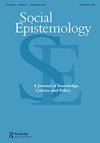Introduction to the Special Issue: “Expertise, Semiotics and Interactivity”
IF 2
2区 哲学
Q1 HISTORY & PHILOSOPHY OF SCIENCE
引用次数: 0
Abstract
ABSTRACTIn this article, we offer an overview of the philosophical and psychological literatures on expertise. Work so far has failed to engage with recent work in embodied and encultured cognition--in particular the notions of interactivity and semiosis. We suggest how bringing these concepts on board reveals new areas of research concerning the philosophy and psychology of expertise. We conclude with a brief synopsis of each paper.KEYWORDS: Expertiseinteractivitysemiotics Disclosure statementNo potential conflict of interest was reported by the author(s).Notes1. These are keywords from abstracts that occur together in the dataset at least 25 times and clustered together based on their frequency of co-occurrence as well as the documents in which they co-occur.2. Apologies to Hilary Putnam.Additional informationNotes on contributorsCharles LassiterCharles Lassiter is Associate Professor of Philosophy at Gonzaga University. His research focuses on the epistemology and metaphysics of mind of encultured cognition.Sarah Bro TrasmundiSarah Bro Trasmundi is Associate Professor of Cognitive Ethnography at the University of Southern Denmark and Researcher at Oslo University in the research group ‘Literature, Cognition and Emotions’. She focuses on the intersection between cognition, imagination, and language in domains such as literature, interaction, reading and education.特刊简介:“专业知识、符号学与互动”
在本文中,我们提供了一个概述的哲学和心理学文献的专业知识。到目前为止,这项工作未能与最近在具体化和文化认知方面的研究相结合——特别是互动性和符号学的概念。我们建议如何将这些概念引入董事会,揭示有关专业知识的哲学和心理学的新研究领域。最后,我们对每篇论文都作了简要介绍。关键词:专家;互动性;符号学披露声明作者未报告潜在的利益冲突。这些关键词来自于在数据集中至少出现25次的摘要,并根据它们共同出现的频率以及它们共同出现的文档聚集在一起。向希拉里·普特南道歉。作者简介:charles Lassiter是冈萨加大学哲学副教授。他的研究重点是文化认知的认识论和心灵形而上学。Sarah Bro Trasmundi是南丹麦大学认知人种学副教授,也是奥斯陆大学“文学、认知和情感”研究小组的研究员。她专注于认知、想象和语言在文学、互动、阅读和教育等领域的交叉。
本文章由计算机程序翻译,如有差异,请以英文原文为准。
求助全文
约1分钟内获得全文
求助全文
来源期刊

Social Epistemology
Multiple-
CiteScore
2.60
自引率
17.60%
发文量
60
期刊介绍:
Social Epistemology provides a forum for philosophical and social scientific enquiry that incorporates the work of scholars from a variety of disciplines who share a concern with the production, assessment and validation of knowledge. The journal covers both empirical research into the origination and transmission of knowledge and normative considerations which arise as such research is implemented, serving as a guide for directing contemporary knowledge enterprises. Social Epistemology publishes "exchanges" which are the collective product of several contributors and take the form of critical syntheses, open peer commentaries interviews, applications, provocations, reviews and responses
 求助内容:
求助内容: 应助结果提醒方式:
应助结果提醒方式:


